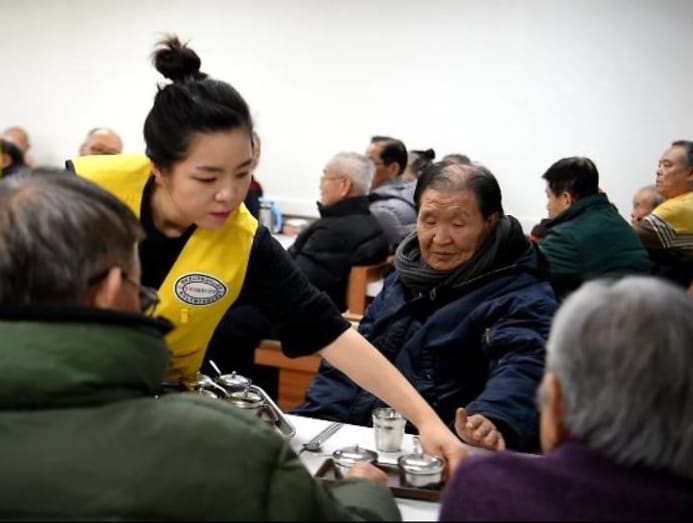Free funerals and food: A small comfort to South Korea's elderly who live alone, die alone
Community teams are trying to ease the loneliness of the elderly poor, both in life and in death, in a country with the world's highest elderly suicide rate.
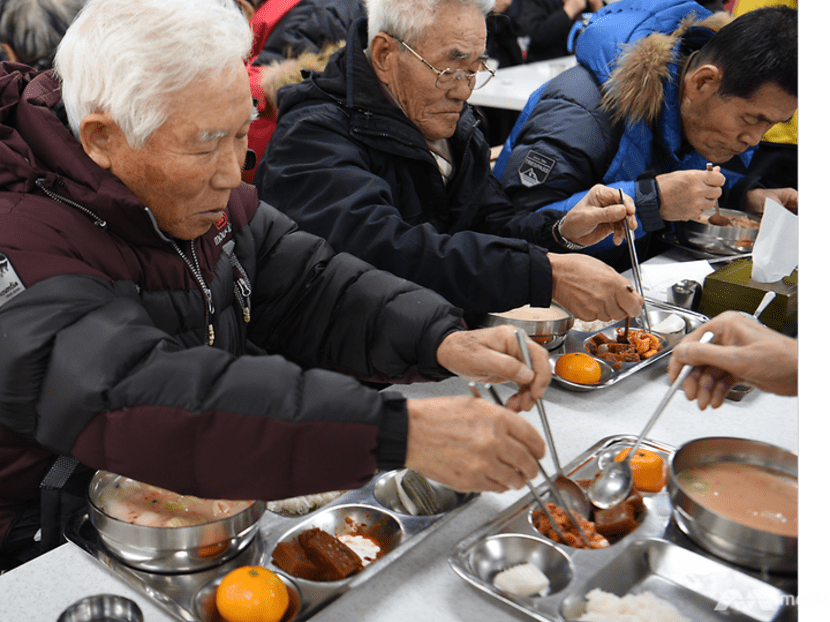
The Angel Food Kitchen serves free meals in Seoul.
SOUTH KOREA: At a crematorium on the outskirts of Seoul, a group of mourners are preparing to collect the body of 54-year-old Seol Min Bok.
They will hold a wake for him, prepare his funeral rites, and then send him on his final journey with a dignified ceremony.
But none of these mourners are related to Mr Seol. They are volunteers from Good Nanum (or Good Sharing), a civic group that offers free funeral services for those who die with no known family members to claim their remains.
Mr Seol died alone in a home shelter. But perhaps in his final moments, it was of some comfort to him that there would be people to send him off.
Said Good Nanum’s director Park Jin-Ok: “Frankly, lonely people who live in solitude would rather find happiness in death. And when they want to let go of life, I want them to know that they are not alone, that someone is with them.”
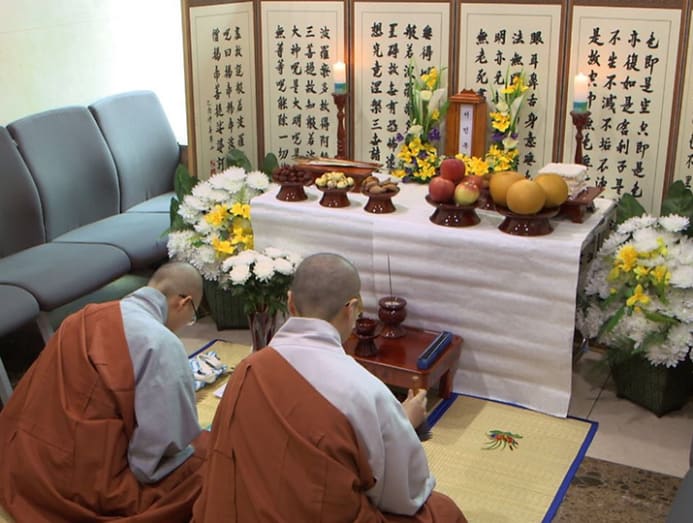
MORE DYING ALONE
It paints a bleak picture of a society where, in Mr Park’s words, “the funeral is the final hope” of those who live in hardship – like the lonely old man who kept Mr Park’s phone number carefully noted down in his room, so that at least when he died there would be someone to give him the all-important rites to ease him into the next world.
Almost half of South Korea’s population over the age of 65 lives in poverty, and nearly two-thirds of its seniors get by alone.
In a country ranked as one of the world’s richest by Gross Domestic Product, welfare safety nets are limited. And the traditional family nucleus is breaking down, leaving many elderly poor without means of support. (Read: Poor and on their own, South Korea’s elderly who will ‘work until they die’)
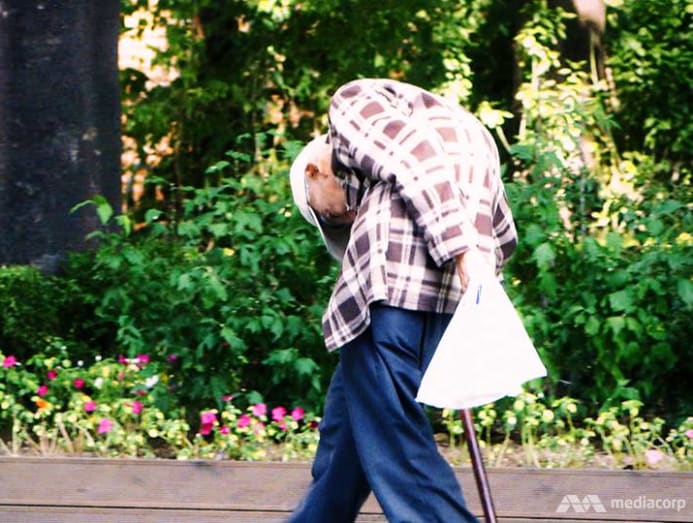
This is where ground-up initiatives and the community, from non-governmental organisations to churches, have stepped in to try to fill the gap.
Good Nanum, which operates only within Seoul, handles about four free funerals a week. And Mr Park says that of late, the number of elderly folks dying without family or friends has been increasing.
“Living is a problem, but now dying is also a problem,” he told the programme Get Rea! (Watch the episode here)
“How a person is handled at the end of his life, shows how society treats that person when he is alive.”
HIGH SUICIDE RATE ‘SHAMEFUL’
Against this backdrop of poverty and loneliness, it is no surprise that depression is common among the old. South Korea’s elderly suicide rate is the highest among OECD countries.
Calling this “shameful”, National Assembly Health and Welfare Committee chairman Yang Seung-Jo said: “Various problems arise when they live alone. They have nutrition issues, and they have to deal with long periods of loneliness. They do it (commit suicide) so as not to be a burden.”
WATCH: The toll that loneliness takes (2:26)
To curb the problem, community Suicide Watch units have been set up. Volunteer Kim Byung-Gook, 83, works on such a team in his Seoul suburb of Eunpyeong. He gets the names of old folks who live alone from a government registry, and calls them up twice a day as well as visits them every week.
Said Mr Kim: “By doing this, we prevent them from being on their own. If you live alone for a while, you will start to wonder why you exist in this world. Once you have such thoughts, you may resort to extreme measures.”
He should know – he lives by himself in a rented room so as not to inconvenience his five children. He is paid US$180 a month by the government for his work on the suicide watch.
To tackle the problem of isolation, Gyeonggi province piloted a programme of community houses for the elderly in 2013.
Called Carnation Houses, these are day centres where the elderly who live alone can come together and cook, sleep and care for each other. There is also work where, for example, they can peel garlic for US$4 a bag.

This is one solution that works for seniors in ill health, like Oh Geum Yong, 82, who still want their independence. “If I go to a nursing home," she said, "it would be expensive and a burden on my kids. I would lose my freedom and not be able to live the way I want.”
Other provinces have followed its lead and there are now more than 120 similar communal houses in South Korea.
QUEUING FOR HOURS IN WINTER FOR FREE FOOD
Also providing a nexus for companionship, as well as food to fill the stomach, are charity kitchens throughout the country run by volunteer groups.
The National Volunteer Associations runs 26 such kitchens, and more than 6,000 seniors drop in each day for warm meals that typically consist of milky ox-bone soup, kimchi, rice cakes and acorn jelly.
Some travel as far as two hours for the free meals and company. On some days, the food runs out. One bitterly cold morning, with the temperature at minus-10 degree Celsius, many were spotted queueing for several hours outside the Angel Soup Kitchen near Jongmyo Park in Seoul, waiting for the doors to open.
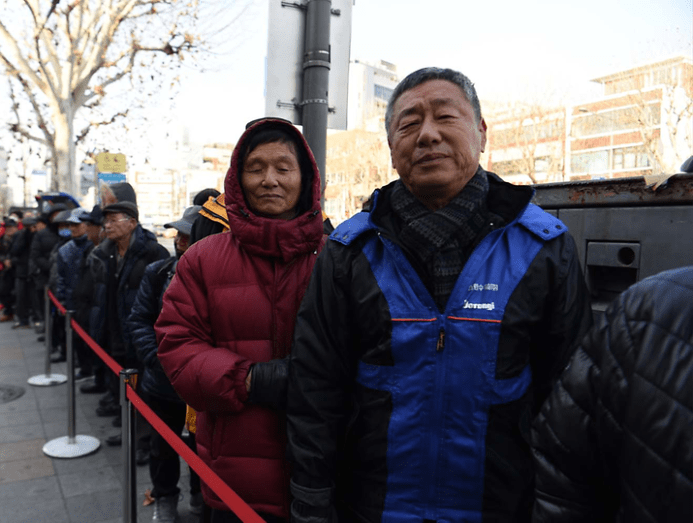
Only those aged 70 and above are served at this kitchen. While many eat quickly and leave, Ms Lee Hyun Mee, a manager with the association, said that some stay on to interact with other seniors and the volunteers. But dealing with them isn’t always easy.
“They’ve been alone for so long, they don’t express themselves well,” said Ms Lee. “When we try to give them a massage, they ask angrily what we are trying to do.
“Unless you have a strong sense of volunteerism, it is not easy - we work longer hours than the average worker, but our willingness to serve has gotten us to where we are now.”
WATCH: A kitchen-ful of angels (3:09)
Like Angel Soup Kitchen, some churches in Seoul have stepped up efforts to support the elderly poor. Today, at least 100 churches give handouts once a week. A gift of US$1.50, an egg and a rice cake can draw queues that are 400 strong.
Ms Lee said it warms her heart when the elderly folks express their bare-bones gratitude to volunteers. “They’ve had such tough and lonely lives, all they do is say ‘thank you’ when they leave.”
She said: “I lived with my grandmother when I was young. I always feel remorseful for not taking care of her well when she was alive. So I take care of these seniors like how I could have taken care of my grandmother.”
This is part of a CNA Insider series exploring the issues of elderly poverty in Vietnam, South Korea, Singapore and Myanmar. To read more:
Poor and on their own, South Korea’s elderly who will ‘work until they die’
